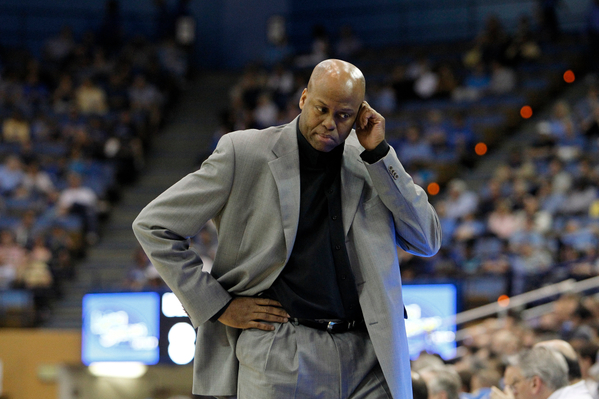Posted by nvr1983 on September 30th, 2013

- It didn’t take long for Appalachian State to turn the tables after the media began to attack the school for not releasing Devontae Graham from his National Letter of Intent. Graham, who recently shot up the recruiting rankings, was a lightly regarded recruit when he signed with Appalachian State and now is at Brewster Academy. Now that Graham is more highly regarded he is looking to be released from the Letter of Intent to look at more high-profile schools. After receiving a great deal of media criticism for not complying with Gardner’s wishes the school issued a release accusing North Carolina State of tampering. On the surface we might question the accusation, but when you consider that Graham played with Mark Gottfried’s son the accusation becomes a little more interesting. Oh, and the two schools play each other on November 8. That should be a fun post-game handshake.
- It seems like we are writing more about “pay-For-play” than any other topic these days, but it seems like that is the major topic that everybody seems to be focused in on. Two of the better takes on the issue over the weekend came from Michael Rosenberg, who says “Pay-for-play is not the issue”, and Gary Walters (Princeton AD and former member of the NCAA Tournament Selection Committee), who says the debate over stipends obscures the bigger issues within sports. Most of the analysis that we have linked to and provided has focused on the pure economics of the issue, but if you want to read nuanced takes on the philosophical dilemmas surrounding the NCAA these are a great place to start.
- As we mentioned last week, Sports Illustrated‘s Andy Glockner was making his way through the top 20 current college programs. On Friday, Glockner concluded with his top five programs. The five programs (in order)–Kansas, Kentucky, Duke, North Carolina, and Michigan State–should not come as any surprise and we don’t have any issue with the order either although we can understand how some people may have issues with Kentucky and North Carolina given their inconsistency lately. It was an issue that we dealt with back in 2009 when we complied our Team of the 2000s rankings and was the primary source of debate at the time. Looking back on our rankings and what Glockner came out with it is interesting to see how much some programs moved up (Kentucky didn’t even make honorable mention–hello, Billy Gillispie) while others have fallen off considerably (particularly Maryland), but for the most part the order has remained relatively constant.
- One of the things we love about rankings is the methodology used to create them. We already discussed Andy Glockner’s college basketball program rankings and as we said we don’t particularly have any major issues with his rankings, but we do with the National College Scouting Association “Power Rankings”. The NCSA, which as far as we can tell is a recruiting agency, put together a ranking list of the top college programs by averaging their US News & World Report ranking, Learfield Sports Directors’ Cup ranking, and graduation rate. Their selection of Duke is not particularly notable (although it led one assistant coach at Duke to proudly announce it), but the methodology seems deeply flawed. Aside from our issues with the US News & World Report rankings, which mirror most of what you have read about those rankings over the past decade, the use of graduation rates, which can be played with, and comparing Division I programs to Division III programs in terms of athletic performance seems debatable at best. The equal weighting of the different rankings creates some interesting outcomes particularly when Florida comes in at 240th in graduation rates bringing them down the 82nd overall despite coming in 2nd in the Directors’ Cup rankings. And then there is Colorado School of Mines coming in 39th overall despite a fairly unimpressive US News & World Report ranking and a mediocre graduation rate thanks to a 10th place showing in the Division II Directors’ Cup.
- Over the past few years we have witnessed many cases of devastating diseases taking away many coaches and their family members. Still the news that Mark Fisher, the son of San Diego State coach Steve Fisher, had been diagnosed with amyotrophic lateral sclerosis, a debilitating progressive neurodegenerative disease more commonly known as Lou Gehrig’s disease. According to reports, those within the program have known about Fisher’s condition for over two years, but possibly with the progression he has had his role reassigned from being assistant coach to assistant to the head coach while several other members of the staff shift up a spot to fill his void. Neither the school nor other members of the team provided much more detail on Fisher’s condition or what prompted the announcement/change so as always in these situations we will simply wish Fisher and his family the best as they deal with this condition.
| morning 5, Regular Features
| Tagged: appalachian state, devontae graham, duke, florida, kansas, kentucky, mark fisher, michigan state, nc state, north carolina, north carolina state, san diego state, unc
Share this story











































